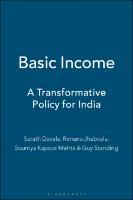Basic Income
A Transformative Policy for India
Author(s)
Davala, Sarath
Jhabvala, Renana
Standing, Guy
Mehta, Soumya Kapoor
Language
EnglishAbstract
This book is available as open access through the Bloomsbury Open Access programme and is available on www.bloomsburycollections.com. Would it be possible to provide people with a basic income as a right? The idea has a long history. This book draws on two pilot schemes conducted in the Indian State of Madhya Pradesh, in which thousands of men, women and children were provided with an unconditional monthly cash payment. In a context in which the Indian government at national and state levels spends a vast amount on subsidies and selective schemes that are chronically expensive, inefficient, inequitable and subject to extensive corruption, there is scope for switching at least some of the spending to a modest basic income. This book explores what would be likely to happen if this were done. The book draws on a series of evaluation surveys conducted over the course of the eighteen months in which the main pilot was in operation, supplemented with detailed case studies of individuals and families. It looks at the impact on health and nutrition, on schooling, on economic activity, women’s agency and the welfare of those with disabilities. Above all, the book considers whether or not a basic income could be transformative, in not only improving individual and family welfare but in promoting economic growth and development, as well as having an emancipatory effect for people long mired in conditions of poverty and economic insecurity.
Keywords
Industrial arbitration and negotiation; Public administration; Development studies; Poverty and precarityDOI
10.5040/9781472593061ISBN
9781472583130, 9781472583123, 9781472583130Publisher
Bloomsbury AcademicPublisher website
https://www.bloomsbury.com/academic/Publication date and place
London, 2015Imprint
Bloomsbury AcademicClassification
Development studies
Political activism / Political engagement
Development economics and emerging economies
Welfare economics


 Download
Download